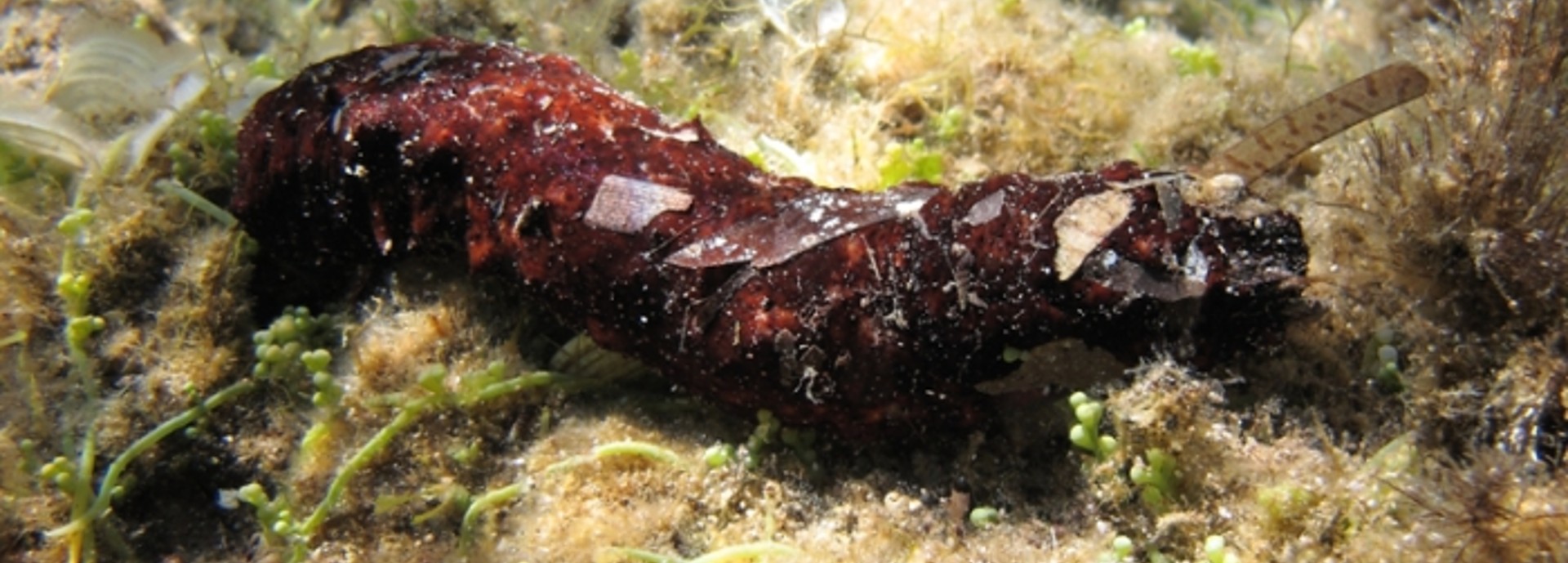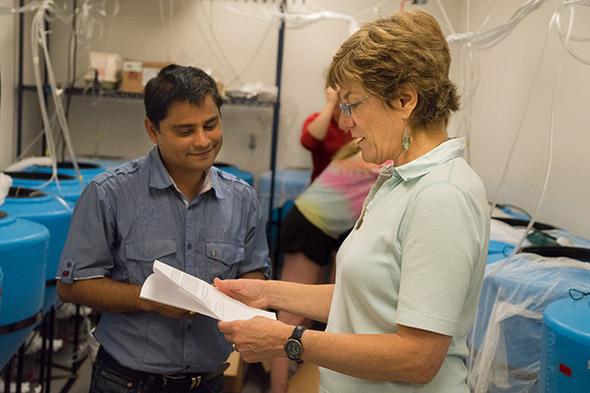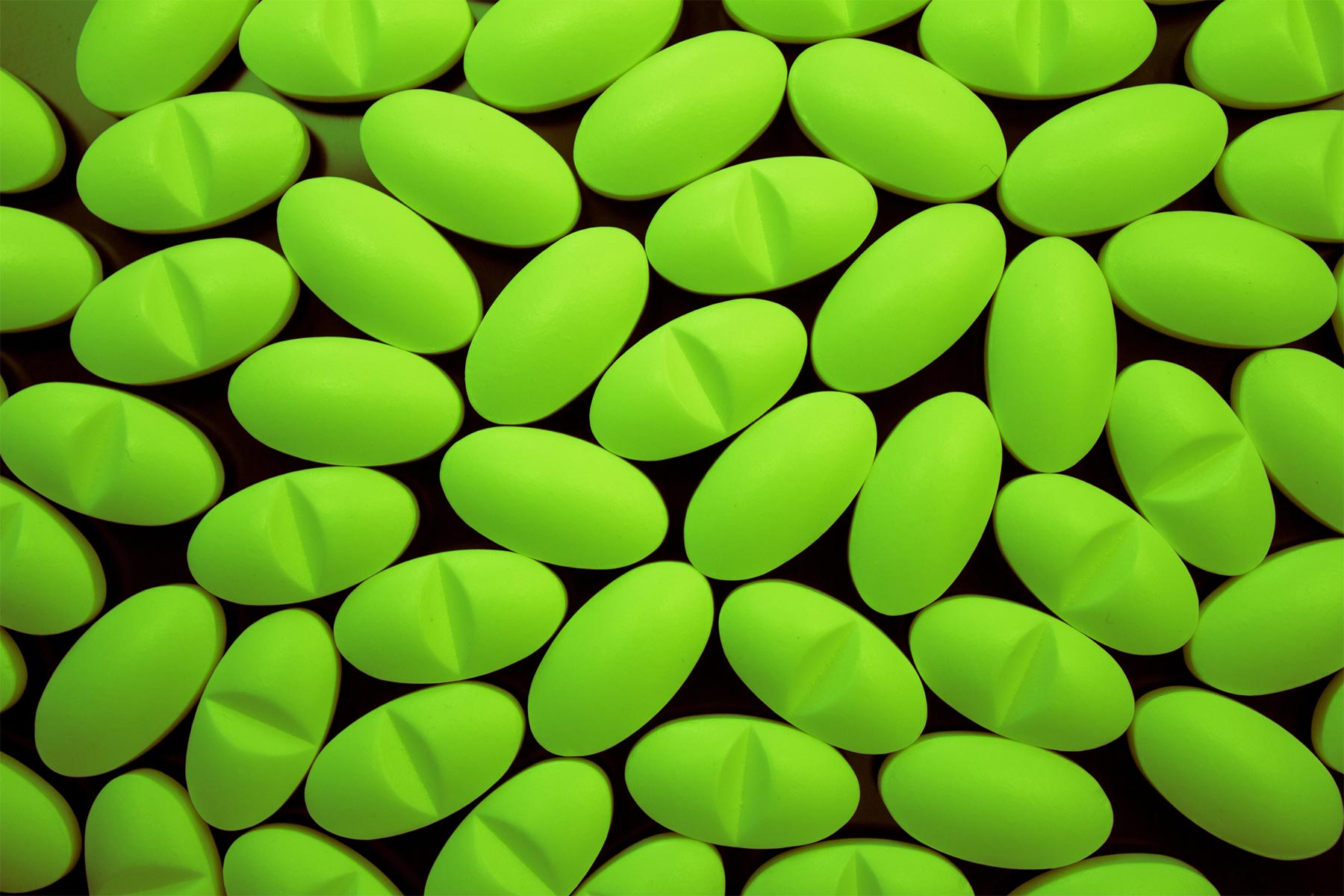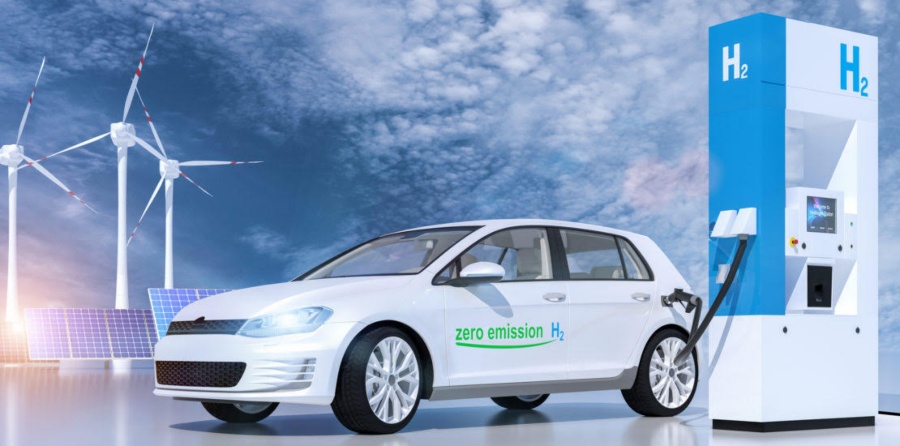
via University of Stirling
Help to solve one of the world’s most pressing dilemmas – how to feed our growing population whilst protecting the planet – may be at hand from a surprising ally – the sea cucumber.
New research led by the University of Stirling’s Institute of Aquaculture shows how sea cucumbers – a delicacy in Asia – can flourish by feeding and growing on organic waste released from commercial fish farms in the Mediterranean.
The discovery means adding sea cucumbers can reduce the environmental impacts of marine fish farming whilst providing a high value extra product. Mediterranean sea cucumbers can fetch between €30/kg dried and €120/kg as processed product, where farmed sea bream are currently worth just six euros per kilo.
Karl Cutajar
PhD researcher at the Institute of Aquaculture
Something that removes organic waste, which can have a negative impact on the seafloor, whilst being a valuable commercial product, without the need for feed input, is an exciting discovery that presents environmental and economic opportunities.
PhD researcher at the Institute of Aquaculture, Karl Cutajar, said: “This research shows the feeding connectivity between fish and sea cucumbers under marine commercial fish cages, which means that farming them together in an integrated multi-trophic aquaculture (IMTA) system is viable.
“Our results show that sea cucumbers take up fish farm waste and how this helps the sea cucumber to grow.
“Something that removes organic waste, which can have a negative impact on the seafloor, whilst being a valuable commercial product, without the need for feed input, is an exciting discovery that presents environmental and economic opportunities.”
Sea cucumbers in high demand
In Asia sea cucumbers are highly in demand for food but supply is short, even causing overfishing in some areas. Sea cucumbers also have antibacterial and anticancer properties, and are increasingly being investigated for medicinal and pharmaceutical uses worldwide.
Different varieties of sea cucumber also grow in colder waters such as those around the UK, and research is beginning to explore their value and impact, especially around the processing and use of organic waste from marine aquaculture.
This research, part of the European Union’s Horizon 2020-funded project Tools for Assessment and Planning of Aquaculture Sustainability (TAPAS), carried out with AquaBiotech Group and the University of Palermo, combined two analytical techniques to prove the cucumbers were successfully processing the fish waste. Stable isotopes, used to assess diet, showed that the sea cucumbers were using the fish waste as their dominant food source. Fatty acid analysis in sea cucumbers grown near fish cages showed the presence of terrestrial, plant-based ingredients that could only have come from fish feed, showing that these sea cucumbers were using this source of organic waste to grow.
Angus Sharman, of fish farm MFF Ltd in Malta, where the research took place, said: “As the demand for seafood grows, MFF Ltd strongly believes in the need for the development of sustainable aquaculture, possibly through IMTA systems such as this. The application of this technology across Mediterranean aquaculture now seems very possible.”
Circular economy
Mr Cutajar added: “Our research showed that the nutritional benefits of sea cucumbers produced near fish cages may have the potential to create economic value for producers to invest in sustainably farmed products and, as preference for eco-labelled products increases, these findings could encourage product diversification through IMTA.”
Professor Trevor Telfer of the Institute of Aquaculture, who oversaw the research, said: “There is increasing interest in IMTA systems in aquaculture, as there is in circular economy systems in other industries, as a way to find sustainable solutions to future challenges in seafood production. We are very excited by these findings.”
Original Article: How the humble sea cucumber could transform fish farming
More from: University of Stirling | University of Palermo
The Latest Updates from Bing News & Google News
Go deeper with Bing News on:
Sea cucumbers
- In the Kitchen With ‘Real Americans’ Author Rachel Khong
For all these reasons, people who know Khong’s work tend to arrive at her fiction with certain expectations. To some, her 2017 debut novel Goodbye, Vitamin, about a young woman caring for her father ...
- Sea cucumber farmers enjoy bountiful harvest in Fujian
Sea cucumber harvesting is well underway in Lianjiang County of southeast China's Fujian Province. More than 50 million sea cucumbers have been harvested from the sea this year as local farmers are ...
- Keelakarai police seize 700kg of sea cucumber
Madurai: Keelakarai police in Ramanathapuram district seized 700kg of sea cucumber from a warehouse in Keelakarai town on Sunday and arrested two peop.
- Fact Check: A Video Purporting To Document the Feeding Habits of Sea Cucumbers Got the Internet Asking Questions. Here Are the Answers
A video shared to Reddit on April 3, 2024, showed a sea cucumber eating.
- New Deep-Sea Cucumber Has 100 Feet
A new species of deep-sea cucumber has over 100 feet in alternating two or three rows. This means of course that when it plays the This Little Piggy nursery rhyme it needs to repeat it 25 times. The ...
Go deeper with Google Headlines on:
Sea cucumbers
[google_news title=”” keyword=”sea cucumbers” num_posts=”5″ blurb_length=”0″ show_thumb=”left”]
Go deeper with Bing News on:
Sustainable aquaculture
- Small-scale aquaculture holds big potential for working waterfronts
A working waterfront that combines wild harvesting with small-scale aquaculture can help commercial fishermen diversify their catch to harvest more months of the year and adapt quicker to ...
- North Coast Seafoods charts course for sustainable seafood with Naked product line
With its vertically integrated supply chain, family-owned North Coast Seafoods connects directly with its fishing partners around the world while providing transparent communications around seafood ...
- Shift Towards Natural and Sustainable Choices Fuels Marine Active Ingredients Market to Hit US$ 18,058.5 Million Valuation in 2033
The Global Marine Active Ingredient Market size is estimated to exhibit an impressive growth rate from 2023 to 2033. The global market is anticipated to cross a valuation of US$ 9,709.0 million in ...
- FEAP: European aquaculture suffering from imbalance
"The E.U.’s aquaculture production has been stagnating since the turn of the century, while it has grown exponentially around the world," FEAP said in a statement. "Difficulties in obtaining licenses ...
- Cyprus hailed as sustainable aquaculture hotspot
Cyprus has been lauded as leading the way in sustainable aquaculture, as the country collaborates with the Commonwealth in establishing a new centre of excellen ...
Go deeper with Google Headlines on:
Sustainable aquaculture
[google_news title=”” keyword=”sustainable aquaculture” num_posts=”5″ blurb_length=”0″ show_thumb=”left”]










